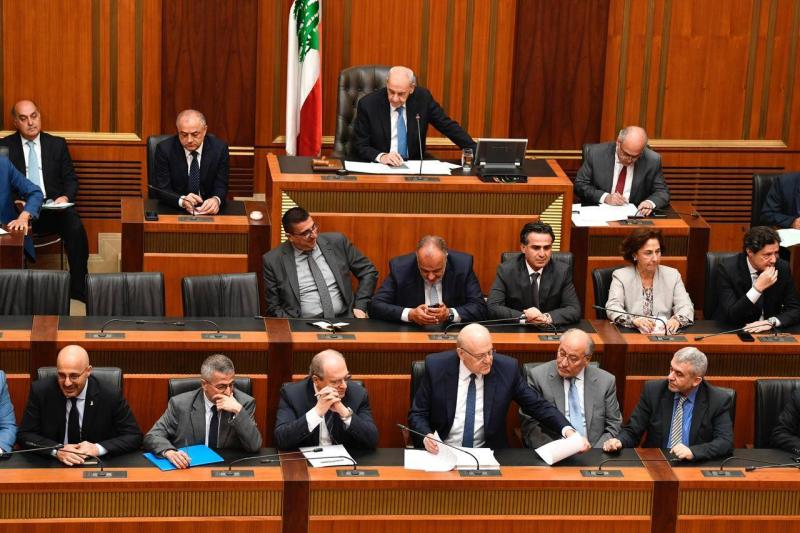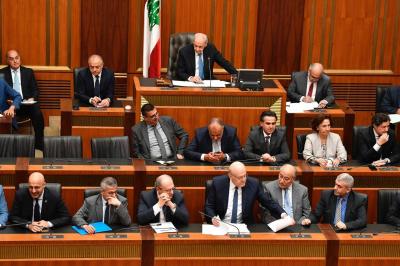At the end of the parliamentary session dedicated to discussing the refugee issue and accepting the one billion dollar donation, the Parliament approved a recommendation consisting of nine points: "The Parliament convened in its general assembly on 15/5/2024, after listening to the Prime Minister and members of Parliament regarding the European aid package and the Syrian displacement file, unanimously decided on the following recommendation:
Lebanon has been suffering for more than 13 years from the Syrian displacement problem, with the number of those who have entered exceeding two million displaced persons, constituting 44% of the population without accurate and complete records organized by the relevant official authorities. Consequently, controlling and organizing their movement has been impossible due to the lack of cooperation from the United Nations High Commissioner for Refugees, under various pretexts concerning the handover of the existing lists it holds about them, and amidst moral protection from certain countries and bodies that have encouraged their presence in Lebanon for either political purposes or due to their unwillingness to absorb a portion of them.
The Syrian displacement has economically, financially, socially, security-wise, and environmentally impacted Lebanon, affecting its overall stability, alongside an increasing sense of concern among the general Lebanese population regarding demographic and societal changes. Conversely, this more complex and dangerous issue is indeed the file around which the Lebanese have unified from a national perspective, rejecting any approach rooted in racism or targeting outside of legal frameworks.
Lebanon, for many social, economic, and demographic considerations, and because it is not a country of asylum, is not constitutionally, legally, or realistically prepared to be one. This was confirmed by the Memorandum of Understanding signed between the Lebanese government, represented by the General Directorate of General Security, and the regional office of the UNHCR on 9/9/2003, published in the official gazette No. 52 on 13/11/2003, which remains in effect, organizing the relationship between the State and the Commission, and which emphasizes the return of displaced persons to their original homeland or their resettlement in a third country.
In light of this introduction, and from the oversight role of the Parliament, and in adherence to the Constitution, laws, and the aforementioned agreement, and with the aim of returning undocumented Syrian entrants and residents in Lebanon to their country within a maximum of one year from this date, the Parliament recommends the government as follows:
1. Form a ministerial committee headed by the Prime Minister, with the participation of the Ministers of Defense, Interior, Displaced Persons, Social Affairs, and the leadership of the Army, General Security, Internal Security, and State Security, to communicate and closely follow up with international and regional entities and various bodies, particularly with the Syrian government, and to establish a detailed timetable for the return of the displaced, excluding special cases protected by Lebanese laws as determined by the committee.
2. Confirm Lebanon's commitment to the content of the aforementioned agreement as a basis for addressing the issue, and obligate the UNHCR to implement its provisions fully through diplomatic means, taking necessary actions for implementation and providing statistics and files related to the displaced persons in its possession, and request that it coordinate with its office in Syria to facilitate their return to their country.
3. A clear commitment to applying existing laws governing entry into Lebanon, residence, and exit, particularly the law issued on 10/7/1962 and related implementing decrees, especially Decree No. 10188 dated 28/7/1962, along with Lebanese labor laws and tax and municipal fee laws, among others.
4. Take the necessary legal actions for the handover of prisoners among the displaced to the Syrian authorities, according to established laws and procedures.
5. Call on the international community and donor organizations to assist the government in allocating necessary resources for military and security agencies to control land borders and coordinate with the Syrian side to restrict movement via legal crossings between the two countries.
6. Request that all UN bodies, especially the UNHCR and international and European donor entities, adopt incentives and financial and humanitarian assistance to encourage the return of the displaced to their country, through the Lebanese state and its institutions or with its consent, and not allow the exploitation of this matter to imply consent for their continued stay in Lebanon, while encouraging these entities to secure such provisions within Syria.
7. Utilize decisions issued by the United Nations, including its decision on the early recovery plan issued in 2021, which may serve as an entry point to expedite the return to Syria, through assistance to rehabilitate infrastructure without subjecting donor countries to Caesar Act sanctions.
8. Convey a clear message to the countries and entities involved in the displacement file that Lebanon can no longer serve as a barrier to the transfer of displaced persons to other countries, and that it will not be its role to protect the borders of these countries from the possibility of those wishing or attempting to leave Lebanon by any means possible. Therefore, the primary responsibility is to redirect support toward enhancing the transition of the displaced and ensuring their stability in their homeland along with what that requires for securing their livelihoods.
9. Commit the government to this recommendation and provide a report to the Parliament every three months on the stages of implementing its content."




